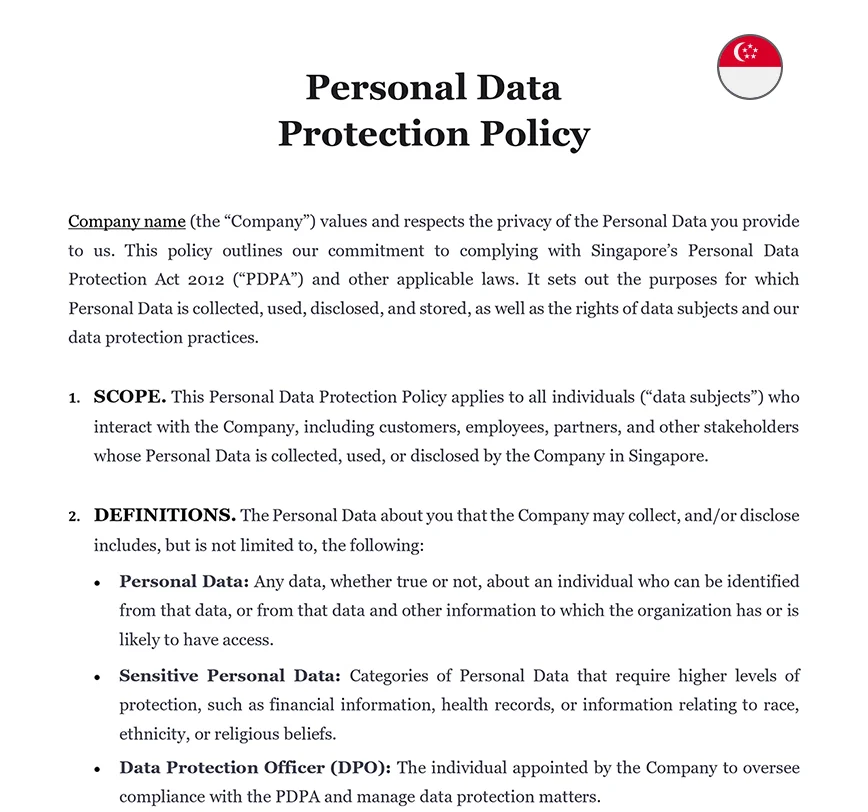Ready to use legal template
Drafted by experienced lawyers
Compliant with Singapore law
Ready to use legal template
Drafted by lawyers
Compliant with Singapore law
Home › Intellectual property › Personal Data Protection Policy
Learn more about Personal Data Protection Policy in Singapore
In today’s digital age, protecting personal data is not just a legal requirement but a fundamental aspect of building trust with your clients, employees, and partners. Our Personal Data Protection Policy template is designed specifically for businesses operating in Singapore, ensuring full compliance with the Personal Data Protection Act (PDPA) 2012. This professionally drafted policy will guide your organization in the proper collection, use, disclosure, and protection of personal data.
Table of contents
-
Why choose our personal data protection policy?
-
What does our personal data protection policy include?
-
Why is a personal data protection policy important?
-
How often should I review my personal data protection policy?
-
What is the difference between employee and client/user consent?
-
What happens if I don’t have a data privacy policy in Singapore?
-
How do I implement the privacy compliance policy in my business?
-
How does this policy enhance data security in my organization?
-
What legal protections does this policy offer in Singapore?
Why choose our personal data protection policy?
Our Personal Data Protection Policy template stands out for its meticulous crafting by experienced lawyers who specialize in Singaporean data protection law. Here’s why our template is the optimal choice for your business:
Expert legal compliance: Created by qualified legal professionals, this template reflects the most up-to-date requirements under Singaporean law, ensuring your business remains compliant with the PDPA 2012.
Comprehensive coverage: It includes detailed sections on data collection, usage, disclosure, protection, retention, and data subject rights, making it a holistic solution for your data protection needs.
Dual consent forms: The template includes both an Employee Consent Form and a Client/User Consent Form, ensuring that you meet consent requirements for all stakeholders.
Easy customization: Provided in an editable Word document format, the template allows you to tailor the policy to your specific business requirements easily.
Instant access: Purchase, download, and implement the policy in just minutes—no delays, no unnecessary steps.
What does our personal data protection policy include?
Our template is a comprehensive document that covers all aspects of data protection required under the PDPA. Here’s what you can expect:
1. Detailed data management sections
The policy outlines clear guidelines for the collection, usage, disclosure, and protection of personal data. This ensures that your business processes personal data in a manner that is lawful, fair, and transparent.
2. Consent management forms
The template includes both an Employee Consent Form and a Client/User Consent Form. These forms are essential for obtaining explicit consent from individuals whose data you collect, in compliance with the PDPA’s consent requirements.
3. Data subject rights
The policy provides a clear explanation of the rights of data subjects, including the right to access, correct, and withdraw their personal data. This not only ensures compliance but also empowers individuals to take control of their data.
4. Data retention and disposal
The policy includes provisions for data retention and disposal, ensuring that personal data is not kept longer than necessary and is securely disposed of when no longer required.
5. Implementation guidelines
The template provides step-by-step instructions on how to implement the policy within your organization, making it easy to integrate into your existing processes.
Why is a personal data protection policy important?
Having a robust Personal Data Protection Policy is not only a legal requirement but also a critical element in building trust and protecting your business from potential risks. Here’s why it’s essential:
| ➤ Ensures legal compliance: The PDPA mandates that all organizations in Singapore must have clear policies and practices in place for managing personal data. Failure to comply with these regulations can result in severe penalties, including hefty fines and potential legal action. Our template is designed to help you meet all legal obligations under the PDPA, giving you peace of mind and protecting your business from regulatory risks. |
| ➤ Builds trust with clients and employees: Trust is a vital component of any successful business relationship. By implementing a clear and comprehensive Personal Data Protection Policy, you demonstrate to your clients and employees that you take their privacy seriously. This not only enhances your reputation but also encourages customer loyalty and employee satisfaction. |
| ➤ Mitigates data breach risks: Data breaches can have devastating consequences for any organization, from financial losses to severe reputational damage. A well-structured policy outlines the necessary steps to protect personal data from unauthorized access, disclosure, alteration, and destruction. By proactively managing these risks, your business can avoid costly breaches and maintain its integrity. |




